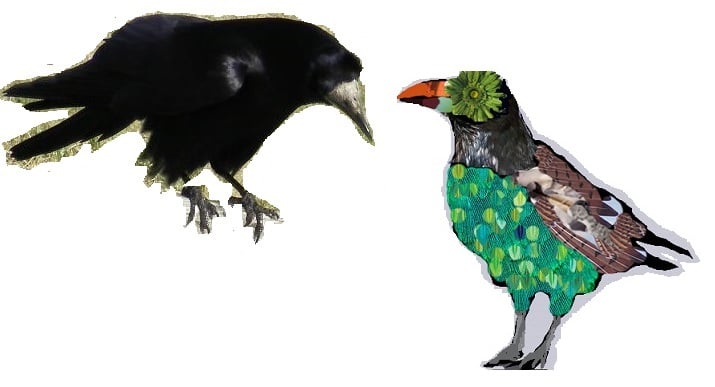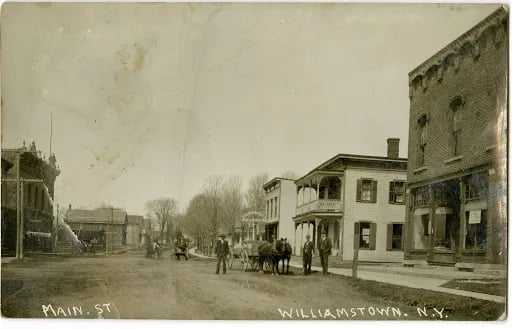The Normal School
Margaret bent to fork a piece of wood into the open door of the stove with a gloved hand, grunting with the bend in her knees. She pushed it toward the back with a poker and stood up, and she creaked the door closed again with a dungeon sound. She made sure the poker was back in its holder and her glove was hung in place before taking a careful step off the platform where the stove was into the gloom of the barely-lit front room. She crossed the nubby living brown rug to the picture window, and she leaned on the back of the big armchair to look out, down the road, toward Nelly’s house. Nelly's light was on, so she turned and switched her porch light on, too.
She turned on the television and stood with her back to the stove door to feel the heat warm through her ever-chilled body. She looked out the window again at the moonlit field, where snow was banked high along the road. There was no snow in the forecast for tomorrow and the roads were clear, sanded and slushed and salted to the bone. She was content that her daughter would have a safe trip from the mountains in the morning. She had readied the kitchen for her grandchildren by taking out a batch of cookies from the freezer to thaw and had stocked the pantry shelves with tiny boxes of cereal. She set her alarm clock to 6 a.m., like every day. Her grandson had asked her why she didn’t sleep in, since she didn’t have to go to work, and she said it was important to get the work of the house done during the first hours of the day. She mostly did it to sleep through the darkest hours of the night, which were so numerous and immovable during these months.
The next day she woke ahead of the alarm with a thought about starting lunch. She went upstairs to the one bathroom in her robe, the stairs sounding off like glaciers cracking, and she pulled the chain to turn on the fluorescent light above the mirror. She took her dentures out of the wash glass and put them in and turned down the beds in the upstairs rooms. The front room was chilly, the sun not yet reaching inside. Margaret could see frost blossoms on the inside of the storm windows. She opened the middle closet door and took out a giant green tortoise plush and put it on the chair in the corner, ducking low at the corner where the ceiling sloped.
She put on slacks and a warm sweater and popped a dickie in the top, so she would have a proper collar, and warm socks and thick shoes. She looked out the picture window and saw a snowmobile pulling up to Nelly’s, probably one of her sons. Nelly had two sons, big, misshapen men whose stomachs held out in full ledges in front of them, and a daughter, a tiny sylph with straw-straight hair. Her oldest had gone up to Pulaski for work, she said, and he’d stop at Kasoag to get her a bottle of the pink wine she liked.
Margaret watched Wheel and then the weather forecast, again, which was still clear. She thought Reg and the kids should be here by now. If they’d left by 8 they could’ve easily got here by 11:30, and here it was noon and they hadn´t arrived. She walked to the mailbox and got the paper. She crossed the slab porch, which was painted red, her favorite color. The Christmas lights were still up, maybe her daughter could take them in. She didn’t dare go for her walk up the Foley Road in case they got to the house to find it empty, so she worked on the crossword at the kitchen table with toast and tea. Frost furred the storm windows in the kitchen and edged the wallpaper-coated plate covering the hole where a chimney once extended from the stove. Margaret added to the shopping list on the chalkboard, which was worn through to brown in some places. The clock above the table marked the seconds against a cheery flower background. She went out to the bureau and pulled open the top drawer to get the silverware out, and she set places for the four of them in the dining room. She put some Jell-O in a cut-glass dish on one side and took a platter of green beans out of the Frigidaire and put it on the other.
When they finally arrived it was nearly one o’clock. They had stopped at King of the Frosties, her daughter said. She’d promised them chips and hot dogs if they were good on the trip.
Now in her early 80s, Margaret had escaped the bonds of the adult physique and had moved of late towards a dumpling form. She didn’t eat hardly anything, but she was taking on earth as she moved closer. Her daughter thought privately that she shouldn’t eat butter. This was during the years of aspirational low-fat diets, so her daughter thought a little butter on toast could cause a person to bloom out so unattractively, but she supposed it didn’t matter much at this point, not enough to say anything.
Margaret’s grandson ran past her and into the living room, flinging himself into the pink chair that spun in a full circle. He pushed off against the floor until he was spinning like a strawberry top, giggling and wicked. The little shit, he knew he wasn’t supposed to. Margaret let out an uncontrolled “heh heh” because she had cursed in her head, something she never did aloud.
She looked at the picture of her parents behind the spinning chair, her mother when she was young, in a high-necked dress with mutton sleeves with flowers printed along the waist, her hair allowed to wave into an updo. Neither she nor her father were smiling. The finery of their wedding dress seemed to forecast a future of movement and industry, of people in high belted clothes toiling towards paved roads, antibiotics.
They wouldn’t know how things were now, so silent with waiting for the young to return. She supposed she couldn’t know how things would be when her grandchildren were soon grown, either.

